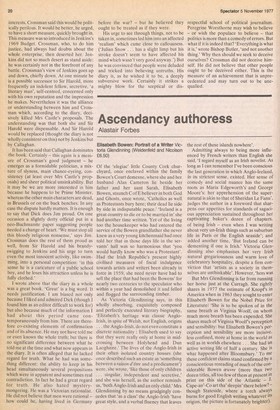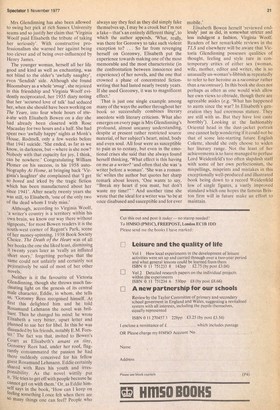Ascendancy authoress
Alastair Forbes
Elisabeth Bowen: Portrait of a Writer Victoria Glendinning (Weidenfeki and Nicolson £6.50) Of the `elegiac' little County Cork churchyard, once enclaved within the family Bowen's Court demesne, where she and her husband Alan Cameron lie beside her father and her aunt Sarah, Elisabeth Bowen, staunch C of E believer in both God and Ghosts, once wrote, 'Catholics as well as Protestants bury here; their dead lie side by side in indisputable peace.' Ireland is a great country to die or to be married in' she had another time written. Yet of the living too the housekeeper who had entered the service of the Bowen grandfather she never knew as a very young kitchenmaid had once told her that in those days life in the servants' hall was so harmonious that 'you would hardly know who was a Protestant'. Had the Irish Republic's present highly civilised measures of fiscal indulgence towards artists and writer S been already in force in 1959, she need never have had to sell the place that had been the Bowens' for nearly two centuries to the speculator who within a year had demolished it and felled and flogged the surrounding timber.
As Victoria Glendinning says, in this wholly absorbing, exquisitely composed and perfectly executed literary biography, 'Elizabeth's heritage was classic AngloIrish, in spite of Welsh, not English, origins . . . the Anglo-Irish, do not even constitute a discrete nationality : Elisabeth used to say that they were really only at home in midcrossing between Holyhead and Dun Laoghaire."The lives of the Anglo-Irish in their often isolated country houses (she once described such an estate as 'something between a raison d'être and a predicament') were, she wrote, 'like those of only children . . . singular, independent and secretive,' and she was herself, as the author reminds us, 'both Anglo-Irish and an only child.' Mrs Glendinning by no means grudgingly concedes that 'as a class' the Anglo-Irish 'have great style, and a verbal fluency that leaves the rest of these islands nowhere'.
Admitting always to being more influenced by French writers than English she said, 'I regard myself as an Irish novelist. As long as I can remember I've been conscious the last generation in which Anglo-Ireland, in its strictest sense, existed. Her sense of comedy and social nuance has the same roots as Maria Edgeworth's and George Moore's: her apprehension of the supernatural is akin to that of Sheridan Le Fanu', judges the author in a foreword that sharpens our appetites for standards of sagacious appreciation sustained throughout her captivating baker's dozen of chapters. of being Irish — even when 1 was writing about very un-Irish things such as suburban life in Paris or the English seaside': and added another time, 'But Ireland can be dementing if one is Irish.' Victoria Glendinning also emphasises her very Irish natural gregariousness and warm love of celebratory hospitality, despite a firm conviction that `artists as a society in themselves are unthinkable'. However, 'hers was But Mrs Glendinning is far from running her horse just at the Curragh. She rightly shares in 1977 the estimate of Knopf's in America when in 1963 they sought to enter Elisabeth Bowen for the Nobel Prize for Literature: 'She is to be spoken of in the same breath as Virginia Woolf, on whom much more breath has been expended. She shares much of Virginia Woolf's perception and sensibility: but Elisabeth Bowen's perception and sensibility are more incisive, less confined, more at home in the world as well as in worlds elsewhere . . She had an active writing life of half a century. She is what happened after Bloomsbury.' To me these confident claims stand confirmed by a conscientious rereading of much of the considerable Bowen te uvre (more than two dozen titles, all too few of them at present in print on this side of the Atlantic — Cape-are-Co art tha' sleepin' there below?' though Stateside, where a torch always burns for good English writing whatever its origins, the picture is fortunately brighter). Mrs Glendinning has also been allowed to swing her pick at rich Sussex University seams and so justify her claim that 'Virginia Woolf paid Elisabeth the tribute of taking her seriously'. With constructive professionalism she warned her against being too clever and of being over-influenced by Henry James.
The younger woman, herself all her life good and kind as well as enchanting, was not blind to the older's 'awfully naughty', even 'fiendish' side. Although she found Bloomsbury as a whole 'smug', she rejoiced in this friendship and Virginia Woolf evidently reciprocated, her 1935 diary noting that her 'accursed love of talk' had seduced her, when she should have been working on The Years, into four whole hours of tetea-tete with Elisabeth Bowen on a day she had already been closeted with Rose Macaulay for two hours and a half, She had spent two 'awfully happy' nights at Monk's House, Rodmell, only a few weeks before that 1941 suicide. 'She ended, as far as we know, in darkness, but – where is she now? Nobody with that capacity for joy, I think, can be nowhere.' Congratulating William Plomer on his success, in his 1958 autobiography At Home, at bringing back Wir-' ginia's laughter' she complained that 'I get so bored and irked by the tragic fiction which has been manufactured about her since 1941'. After nearly twenty years she was still, to Elisabeth, 'one of the only two of the dead whom I truly miss.'
Although, according to Virginia Woolf, 'a writer's country is a territory within his own brain, we know our way there without Signposts,' for most Bowen readers it is the south-west corner of Regent's Park, scene of her money-spinning, 1938 Book Society Choice, The Death of the Heart was of all her books the one she liked least, dismissing it twenty years later as 'really an inflated short story,' forgetting perhaps that the same could not unfairly and certainly not Pejoratively be said of most of her other novels.
Neither is it the favourite of Victoria Glendinning, though she throws much fascinating light on the genesis of its central male character, Eddie, in whom, she tells `Goronwy Rees recognised himself. At first this delighted him and he told Rosamund Lehmann the novel was brilliant. Then he changed his mind: he wrote Elisabeth a very bitter, upset letter and planned to sue her for libel. In this he was dissuaded by his friends, notably E.M. Forster,' The fact was that, invited to Bowen's Court as Elisabeth's amant en titre, Goronwy Rees had, under her roof, flagrantly consummated the passion he had there suddenly conceived for his fellow guest Rosamund Lehmann. Eddie certainly shared with Rees his youth and irresP. onsibility. As the novel wittily put it, He tries to get off with people because he cannot get on with them,' Or, as Eddie himself says in the book, 'How can I keep on feeling something I once felt when there are SO many things one can feel? People who always say they feel as they did simply fake themselves up, I may be a crook but I'm not a fake – that's an entirely different thing', to which the author appends, 'What, really, was there for Goronwy to take such violent exception to? . . . So far from revenging herself on Goronwy, Elisabeth put the experience towards making one of the most memorable and the most characteristic (in the confrontation between innocence and experience) of her novels, and the one that crowned a phase of concentrated fictionwriting that had lasted nearly twenty years. If she used Goronwy, it was to magnificent effect.'
That is just one single example among many of the ways the author throughout her book so successfully combines literary anecdote with literary criticism. What also emerges on every page is Mrs Glendinning's profound, almost uncanny understanding, despite at present rather restricted source material, of her subject's heart, mind, body and even soul. All four were as susceptible to pain as to ecstasy, but even in the emotional crises she said that she always found herself thinking, 'What effect is this having on me as a writer? 'and often that she was 'a writer before a woman'. 'She was a romantic' writes the author but quotes her sharp remark about lovers, 'One wants to say, "Break my heart if you must, but don't waste my time!"' And another time she wrote that the ideal for a writer was `to be at once disabused and susceptible and for ever mobile.'
Elisabeth Bowen herself 'reviewed endlessly' just as did, in somewhat stricter and less indulgent a fashion, Virginia Woolf. Readers of her remarkable reviews in the TLS and elsewhere will be aware that Victoria Glendinning possesses qualities of thought, feeling and style rare in contemporary critics of either sex (woman, wife, mother, editor and writer, she is so unusually un-woman's-libbish as repeatedly to refer to her heroine as a raconteur rather than a raconteuse). In this book she does not perhaps as often as one would wish allow her own views to obtrude, though there are agreeable asides (e.g. 'What has happened to aunts since the war? In Elisabeth's generation they had enormous stature. They are still with us. But they have lost caste horribly). Looking at the fashionably Oriental head in the dust-jacket portrait one cannot help wondering if it could not be that of some late-starting future English Colette, should she only choose to widen her literary range. Not the least of her achievements is to have managed to perfuse Lord Weidenfeld's too often slapdash staff with some of her own perfectionism, the mispellings, misprints and mistakes in this exceptionally well-produced and illustrated book being down to a record Weidenfeld low of single figures, a vastly improved standard which one hopes the famous Brixton firm will in future make an effort to maintain.



































 Previous page
Previous page